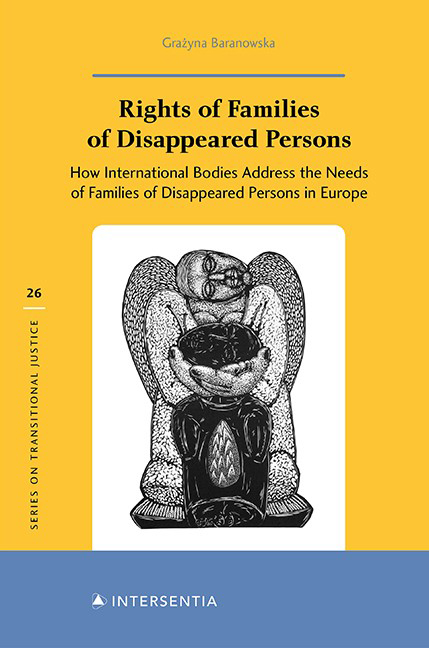Book contents
- Frontmatter
- Acknowledgements
- Contents
- List of Cases
- Chapter 1 Introduction to the Rights and Needs of Families of Disappeared Persons
- Chapter 2 The European Court of Human Rights and Disappeared Persons: Broadening in Substantiating Claims and Narrowing Down Through Application of Temporal Competences
- Chapter 3 The UN Human Rights Committee and Disappeared Persons: Approaches to the Right to Life
- Chapter 4 International Judicial Bodies Established in Response to Conflicts in the Former Yugoslavia: Addressing Mass Disappearances
- Chapter 5 Searching For and Exhuming Disappeared Persons: International Non-Judicial Mechanisms
- Chapter 6 Conclusion: Addressing Rights and Needs of Families of Disappeared Person in Europe
- Index
Chapter 4 - International Judicial Bodies Established in Response to Conflicts in the Former Yugoslavia: Addressing Mass Disappearances
Published online by Cambridge University Press: 10 December 2021
- Frontmatter
- Acknowledgements
- Contents
- List of Cases
- Chapter 1 Introduction to the Rights and Needs of Families of Disappeared Persons
- Chapter 2 The European Court of Human Rights and Disappeared Persons: Broadening in Substantiating Claims and Narrowing Down Through Application of Temporal Competences
- Chapter 3 The UN Human Rights Committee and Disappeared Persons: Approaches to the Right to Life
- Chapter 4 International Judicial Bodies Established in Response to Conflicts in the Former Yugoslavia: Addressing Mass Disappearances
- Chapter 5 Searching For and Exhuming Disappeared Persons: International Non-Judicial Mechanisms
- Chapter 6 Conclusion: Addressing Rights and Needs of Families of Disappeared Person in Europe
- Index
Summary
In response to the massive human rights violations which took place during the conflicts accompanying the breakup of Yugoslavia, international bodies were established with the aim of, inter alia, assisting the victims of these violations. These bodies received complaints concerning many enforced disappearances that occurred during this time. The countries of the former Yugoslavia are the only region analysed in this work in which so many new and innovative institutions were created. This was due not only to the scale of the human rights violations which occurred during the discussed conflicts, but also owing to the existence of the necessary political will to take on such initiatives. Beside the judicial bodies analysed in this chapter, the disappearances during the conflicts in the former Yugoslavia also led to the establishment of an innovative non-judicial body, the Special Process on Missing Persons in former Yugoslavia, which is examined in Chapter 5, section 4.
In analysing the decisions of the Human Rights Chamber for Bosnia and Herzegovina (HRCBiH) and the Human Rights Advisory Panel in Kosovo (HRAP), the same research method is used as for the ECtHR and the HRC. This serves to highlight how the two bodies address the four identified fundamental needs of families of disappeared persons: returning remains; right to know the truth; acceptance of responsibility; and the right to compensation. The sections therefore contain four parallel sub-sections. The first two are essential for making a case (temporal issues – sub-sections 1.3 and 2.3; and substantiating claims – sub-sections 1.4 and 2.4), while the second two concern the families of the disappeared persons and address the identified needs in practice (recognising families as victims – 1.5 and 2.5; and reparation measures – 1.6 and 2.6). The analysis therefore focuses on the interpretation of the jurisprudence of these bodies in relation to temporal issues, substantiating claims, status of the families of disappeared persons, and measures of reparation. Following the analysis of the HRCBiH and HRAP decisions, in the last section of this chapter relevant judgments from the International Criminal Tribunal for the former Yugoslavia (ICTY) are scrutinised.
- Type
- Chapter
- Information
- Rights of Families of Disappeared Persons , pp. 133 - 172Publisher: IntersentiaPrint publication year: 2021



